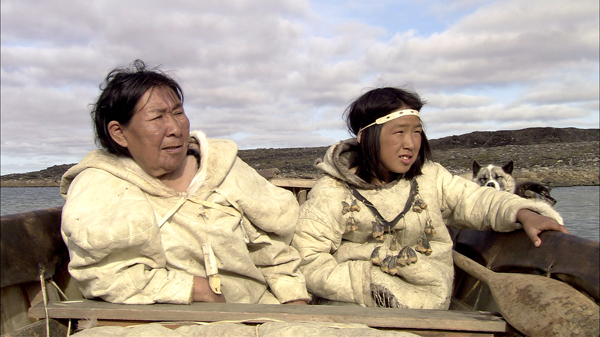|
Reviews of Recent Independent, Foreign, & Documentary Films in Theaters and DVD/Home Video

BEFORE TOMORROW
THE NECESSITIES OF LIFE Before Tomorrow completes “The Fast Runner Trilogy” that was initiated to international acclaim by Zacharias Kunuk’s enthralling Atanarjuat: the Fast Runner (2001). In authentically recreating an ancient legend handed down since the first millennium, Atanarjuat was the first Inuit-produced film to bring Arctic language and culture to contemporary audiences. The second chapter was Kunuk’s and Norman Cohn’s The Journals of Knud Rasmussen (2006), not released in the U.S. but now available at www.isuma.tv. Through incidents and shaman’s visions reported by a Danish adventurer on a 1922 expedition, it strikingly depicted how contact with Europeans led to a wrenching spiritual crisis that struck at the heart of a community. Before Tomorrow emphasizes women’s roles in physical and cultural survival more than the earlier films’ focus on their romantic jealousies and domestic skills. (Co-writer/director Marie-Hélène Cousineau founded the Arnait Video Workshop women’s collective that produced the film.) Based on Danish writer Jorn Riel’s novel that was inspired by the elderly Inuit women he met in northeastern Greenland in the 1950’s, Before Tomorrow counters “Eskimo” stereotypes, beginning in the summery opening scenes set around 1840 when an adventuresome elder brings amusing stories of visiting pale strangers with odd habits and drinks. Among the people who scoff at his tales are two elderly women, a grandmother, Ningiuq (co-writer/director Madeline Piujuq Ivalu), and her friend since childhood, Kutuujuk (Mary Qulitalik). This film offers a rare look at the long-lasting emotional bond between older women who aren’t sisters—and no old folk are left adrift on ice floes Their enduring relationship demonstrates the feistiness that enabled them to reach a ripe old age, even though they sorrowfully anticipate Kutuujuk’s death as a natural end to be accompanied by traditional rituals. Unlike her friend, Ningiuq has her own family. Her grandson, Maniq (Paul-Dylan Ivalu, the star’s grandson in real life), begs to spend the rest of the summer with her catching and drying fish on an island. While she is pleased to have the unexpected company of both her friend and grandson, this casual arrangement will turn fateful, after the horrific results of European contact decimates their community. Grandmother and grandson face a difficult winter together as if they are the last of their kind, and her determination to pass on cultural traditions to Maniq makes their struggle somewhat more future-oriented than just the physical survival seen in John Hillcoat’s The Road, where an adult also fiercely protects a young boy after a disaster. Before Tomorrow lovingly emphasizes how storytelling is as much a proud, nurturing rite of passage for Maniq as catching his first fish. She encourages him to construct a story from his daily life, demonstrating that it takes training and work to maintain oral traditions. This loosely episodic portrayal is not a nostalgic or bitter look back at the way things were, but the open-ended conclusion is depressingly realistic, and foretold in the mournful Kate and Anna McGarrigle song “Why Must We Die“ repeated on the soundtrack. Natar Ungalaaq, the charismatic lead of Atanarjuat, also stars in Canada’s entry last year for the Foreign Language Film Oscar (now available via IFC on Demand). The Necessities of Life is set in the 1950’s when the Canadian government dealt forcibly with the devastating spread of European diseases, particularly tuberculosis, to the native population. Tivii (Ungalaaq) is enjoying summer fishing on Baffin Island with his wife and two daughters when a hospital ship noisily arrives. After being rounded up and x-rayed, Tivii is separated from his family, shorn of his identity, and sent thousands of miles away to a crowded TB sanatorium in Quebec. He’s isolated by unfamiliar food, language, and customs, treated condescendingly, and distraught over how his family can survive without him. His loneliness aggravates his health, despite the friendly overtures of an adjacent patient and a kindly young nurse. As keen an observer of the urban flora and fauna as his native terrain, Tivii craftily plots his escape, only to be defeated by his illness. Awaking in misery back in the ward, he is startled to hear Inuktitut spoken to him, albeit in an unfamiliar accent. It’s a young boy, Kaki (Paul-André Brasseur), a bilingual Inuit patient the nurse found in the children’s wing, who was orphaned, much like the boy in Before Tomorrow. Tivii gains a language and cultural translator (and is finally served salmon instead of spaghetti). He and Kaki embark on a touching yet not overly sentimental fulfillment of their deep needs for family and tradition. Written by anthropologist-turned-filmmaker Bernard Émond and directed by Benoît Pilon in his first fiction feature after several documentaries, they combine poignancy with realism, for a conclusion only somewhat less pessimistic than in Before Tomorrow. While each
film in “The Fast Runner Trilogy” and The Necessities of Life can
be appreciated separately, together they creatively banish stereotypes
with sharp profiles. Both provide insightful and moving perspectives on
the struggles of an indigenous society against human forces as
inexorable as their rugged environment.
Nora Lee Mandel
|

